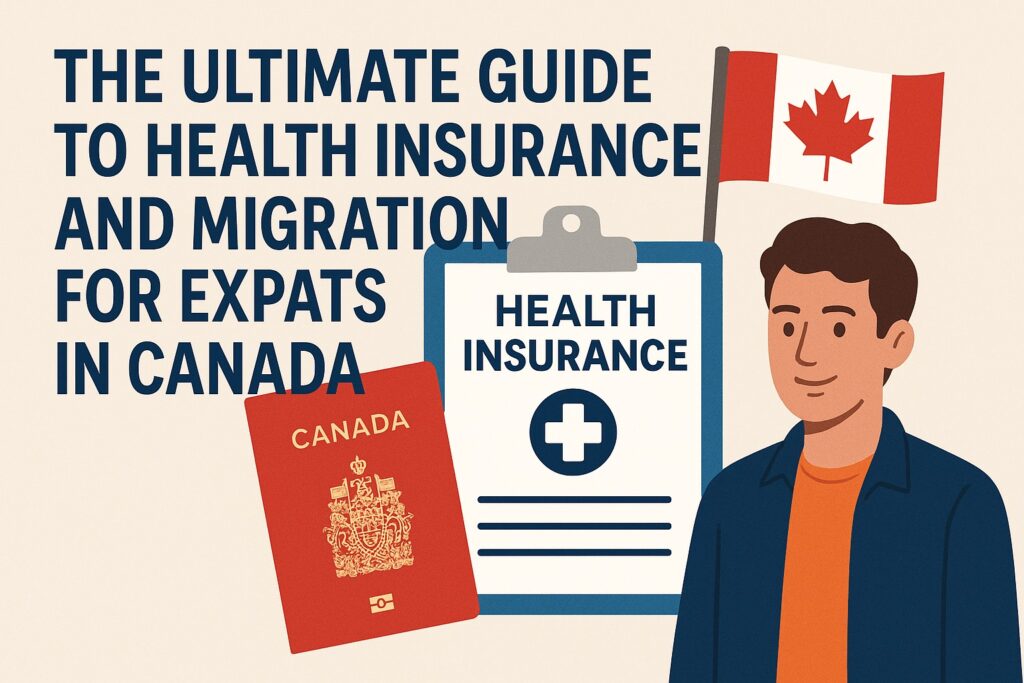Navigating Healthcare and Immigration in the Great White North
*(Detailed comparison with pros, cons, and prices)*
The Canadian Reality for Newcomers
Canada is renowned for its high quality of life, stunning natural landscapes, and a publicly funded healthcare system that is a point of national pride. However, for newcomers—whether on a work permit, study visa, or as a permanent resident awaiting coverage—this system is not immediately accessible.
The critical detail often overlooked is that Canada’s universal healthcare is not universal upon arrival.
Each province and territory administers its own health insurance plan, and all impose a mandatory waiting period before new residents become eligible. This period can range from 2 to 3 months, depending on the province.
During this time, you are entirely responsible for any and all medical costs. A simple visit to a walk-in clinic can cost $100, an ambulance ride $400, and a hospital stay can run into tens of thousands of dollars.
This guide provides an exhaustive analysis of the best international health insurance plans to protect you during this vulnerable period and beyond, coupled with a complete roadmap for navigating Canadian immigration.
A few minutes spent understanding these options could save you from financial catastrophe and ensure a smooth, successful transition to your new life in Canada.

Section 1: Demystifying the Canadian Healthcare System for Expats
1.1 How Medicare Really Works
Canada’s healthcare system, known as Medicare, is based on the Canada Health Act. It is designed to provide universal, prepaid coverage for “medically necessary” services delivered by doctors and in hospitals. The key principles are universality, accessibility, and portability across provinces.
However, the system is often misunderstood by those moving to Canada:
- It is Not “Free”: It is funded through federal and provincial taxes. As a newcomer not yet paying significant Canadian taxes, you are not contributing to this system.
- It is Provincial: Your coverage is tied to the province or territory where you establish residence. Moving from Ontario to British Columbia requires you to re-apply and may trigger a new waiting period.
- It is Limited: Crucially, Medicare does not cover:
- Prescription drugs (outside of hospitals)
- Dental care
- Vision care (for adults)
- Paramedical services (physiotherapy, chiropractic, psychological therapy)
- Ambulance services (fully or partially, depending on the province)
1.2 The Waiting Period: Your Most Vulnerable Time
The provincial waiting period is the single biggest risk factor for uninsured expats. Imagine this scenario: You arrive in Vancouver on a new work permit, full of excitement. On your second week, while hiking, you slip and break your ankle.
The ambulance ride, emergency room visit, X-rays, and cast could easily amount to a bill of $5,000 to $10,000 CAD. Without insurance, you are personally liable for this entire amount.
Provincial Waiting Period Examples (Always Verify with Official Sources):
- Ontario (OHIP): 3 months
- British Columbia (MSP): 2 months (balance of arrival month plus two full months)
- Alberta (AHCIP): 3 months
- Quebec (RAMQ): 3 months
Without private health insurance, you risk:
✔ Facing medical bankruptcy from a single emergency.
✔ Being denied access to non-emergency care due to an inability to pay.
✔ Having your visa or work permit application denied due to failure to meet health insurance requirements.
✔ Delaying necessary doctor visits for ongoing health issues, potentially making them worse.
Section 2: In-Depth Analysis of the Top 7 Insurance Options
Attention: Here’s a tip, take a few minutes and make a quote with all the best expat health insurance companies mentioned below. I say from experience, a good search can save you a lot of money!
2.1 Cigna Global – The Gold Standard for Comprehensive Coverage

Cigna Global is a behemoth in the international health insurance landscape, offering the kind of robust, reliable coverage that provides unparalleled peace of mind for expats facing Canada’s high medical costs.
History and Credibility:
Founded in 1982, Cigna boasts an “A” rating from AM Best, signifying superior financial strength. This is crucial; you need to know your insurer can pay out on large, US-level claims without hesitation.
Specific Coverages Tailored for Canada:
- Seamless Direct Billing: Cigna has established direct billing agreements with a vast network of hospitals and clinics across Canada. This means you can present your card and often pay nothing upfront, avoiding the hassle of claims and reimbursement.
- Chronic Condition Management: After a standard 3-month waiting period, Cigna provides coverage for the ongoing management of chronic conditions like diabetes, hypertension, and asthma. This is a critical feature for those with long-term health needs.
- Maternity and Newborn Care: The Gold and Platinum plans offer substantial maternity coverage (up to $25,000 USD), including prenatal care, delivery, and postnatal care. This is often excluded or severely limited in basic plans.
- Mental Wellness Support: Includes coverage for a significant number of therapy sessions per year (e.g., 30), recognizing the importance of mental health, especially during the stress of relocation.
Ideal For: Expats and families with corporate relocation packages, high-net-worth individuals, and anyone who values maximum security and a hassle-free claims process from day one.
2.2 IMG Global – The Strategic Choice for Budget-Conscious Newcomers

International Medical Group (IMG) has carved out a vital niche by offering flexible, affordable plans that perfectly address the specific “waiting period” problem faced by newcomers to Canada.
Flexible and Targeted Plans:
- Patriot America Plus: This is arguably one of the most popular plans for temporary residents. It’s designed for those on work permits or for parents visiting new grandchildren, offering high maximum limits for a relatively low premium. It covers new illnesses and injuries that occur after the policy start date.
- Global Medical Insurance: For those on a longer-term trajectory, such as individuals who have started the Permanent Residence process, this plan offers more comprehensive, renewable coverage that can bridge the gap until provincial healthcare begins and then supplement it afterward.
Real-World Cost Scenarios (2024 Claims):
- Case 1 (Appendectomy): A 32-year-old on a work permit in Toronto required an emergency appendectomy. The total hospital bill was $38,000 CAD. With his IMG Patriot Platinum plan, he paid only his $500 deductible.
- Case 2 (Respiratory Infection): A student in Vancouver developed a severe respiratory infection, requiring a visit to a walk-in clinic and a prescription. The total cost was $280 CAD. She submitted a claim and was reimbursed 100% after her $100 deductible.
Ideal For: Young professionals on temporary work permits, participants in the International Experience Canada (IEC) program, students, and anyone who needs high-quality emergency coverage without a premium price tag.
2.3 Now Health – The Premier Choice for Demanding Professionals

Now Health caters to a discerning clientele, including entrepreneurs, freelancers, and senior executives, who expect premium service and extensive, flexible coverage.
Premier Service and Network:
The company prides itself on its curated network of high-quality healthcare providers in major urban centers like Toronto, Vancouver, and Montreal. Their focus is on quality over quantity.
Comprehensive Professional Coverage:
- Business Travel Protection: If your role requires you to travel back to your home country or to the high-cost United States, Now Health ensures you remain covered without needing a separate travel policy.
- Loss of Earnings Benefit: This is a critical and often-overlooked feature. If a serious illness or injury prevents you from working, this benefit can provide a monthly stipend (e.g., up to $5,000/month) to replace lost income.
- Personal Liability Cover: Includes coverage if you accidentally cause injury to another person or damage their property.
Ideal For: Freelancers, consultants, entrepreneurs, and high-level professionals who need robust coverage that protects both their health and their ability to earn an income.
2.4 Allianz Care – The Specialist for Families and Corporate Moves

Allianz Care understands that moving a family to a new country involves unique challenges. Their plans are specifically tailored to provide the holistic support that families and individuals on corporate assignments need.
Tailored Solutions for Canadian Life:
- “Easy Entry” Canada Plan: This isn’t just a generic plan sold in Canada; it’s engineered for the newcomer’s journey, often aligning coverage lengths with common provincial waiting periods.
- Family-First Benefits: The plans often include well-child care, covering vaccinations and routine pediatric check-ups according to Canadian schedules. This ensures your children’s health isn’t interrupted by the move.
- Integrated Telemedicine: Allianz provides 24/7 access to telemedicine services, allowing you to consult with a Canadian-licensed doctor for minor ailments via phone or video. This can save a costly and unnecessary trip to a walk-in clinic.
- Essential Add-ons: The ability to seamlessly add dental and vision coverage is a significant advantage, as these are major gaps in the public Medicare system.
Ideal For: Families with children, individuals on corporate relocation packages, and those who appreciate a structured plan that directly addresses the timeline of settling in Canada.
2.5 SafetyWing – The Innovative Model for Digital Nomads and IEC Participants

SafetyWing has disrupted the traditional insurance model with a subscription-based, tech-forward approach that resonates with digital nomads and young travelers on programs like IEC.
The Subscription Model:
- Monthly Flexibility: You pay month-to-month and can cancel at any time. This is perfect for those with uncertain plans or who are traveling through Canada as part of a global itinerary.
- Global Coverage: The policy includes coverage for short trips outside of Canada (e.g., 30 days in the US), which is built-in and not an extra cost.
Important Limitations to Understand:
While affordable, it’s crucial to understand the trade-offs. SafetyWing does not cover pre-existing conditions and has lower overall coverage limits than more traditional insurers. It is designed for catastrophic coverage—serious new accidents and illnesses—not for managing ongoing health conditions.
Ideal For: Digital nomads, International Experience Canada (IEC) participants, backpackers, and anyone on a very tight budget who primarily needs protection against medical emergencies.
2.6 GeoBlue – The Seamless Solution for American Expats

For American citizens moving to Canada, GeoBlue offers a uniquely seamless experience by bridging the healthcare gap between the two countries.
Familiarity and Integration:
- Xplorer Plan: This plan provides access to the Blue Cross Blue Shield network when you are in the United States. For Americans who travel back frequently to visit family or for work, this eliminates the worry of being uninsured during those trips.
- US-Centric Service: The plan structure, app, and customer service are designed with an American user in mind, making the transition smoother.
Ideal For: American citizens, “snowbirds” who spend time in both countries, and expats who frequently travel to the United States.
2.7 Local Providers – The Cost-Conscious Approach
Considering Local “Visitor to Canada” Plans:
Canadian insurers like Manulife, Sun Life, and Blue Cross offer “Visitor to Canada” insurance. These are often the most cost-effective option for very specific, short-term needs (e.g., parents visiting for 2 months). However, they are typically less flexible, rarely cover pre-existing conditions, and are not designed for long-term expats or those who need international portability.
Ideal For: Price-sensitive individuals, those with very straightforward, short-term coverage needs, and savvy researchers.
Section 3: Mega Comparison Table – Expat Health Insurance for Canada (2024)
| Critério | Cigna Global | IMG Global | Allianz Care | Now Health | SafetyWing | GeoBlue | Comparadores / Locais |
| Ideal Para | Cobertura Completa | Orçamento Limitado | Famílias / Corporativo | Profissionais / Freelancers | Nômades Digitais / IEC | Americanos | Melhor Custo-Benefício |
| Cobertura Máx. (USD) | Ilimitada | US$ 1M – 5M | US$ 2M+ | US$ 5M+ | US$ 1M/ano | Varia por plano | US$ 50k – 5M |
| Rede no Canadá | Excelente (90%+) | Boa / Ampla | Forte / Parcerias | Premium / Selecionada | Limitada | Boa | Varia muito |
| Pré-Existências | Cobre após 3 meses | Surtos agudos | Cobre após 12 meses | Cobre após 6 meses | Não cobre | Cobertura Parcial | Raramente |
| Maternidade | US$ 25k (Planos superiores) | Não (apenas complicações) | Incluído (Plus) | US$ 30k | Não cobre | Opcional | Raramente |
| Atendimento Ambulatorial | 80-100% | 80-100% | 90-100% | 100% | 80% após dedutível | 100% | 50-100% |
| Telemedicina | Ilimitada | 10 consul./ano | 24/7 | Ilimitada | Ilimitada | Incluído | Às vezes |
| Medicamentos | 100% | US$ 500-1k limite | US$ 1k/ano | Ilimitado | US$ 500/ano | Incluído | Limite baixo |
| Saúde Mental | 30 sessões/ano | 5 sessões/ano | 20 sessões/ano | 40 sessões/ano | 10 sessões/ano | Incluído | Raramente |
| Repatriação | Incluída | US$ 25k limite | Incluída | Incluída | Incluída | Incluída | Incluída |
| COVID-19 | 100% | 80% | 100% | 100% | 100% | 100% | 100% |
| Tempo de Ativação | 48h | 72h | 24h | 24h | 15 minutos | 24-48h | Imediato a 5 dias |
| App/Suporte | 4.8★ (Multi-idioma) | 4.0★ (EN) | 4.7★ (Multi-idioma) | 4.9★ (5 idiomas) | 4.5★ (EN) | 4.6★ (EN) | Varia |
| Preço Mensal (CAD)* | $250 – $600 | $120 – $300 | $170 – $400 | $300 – $650 | $60 – $150 | $250 – $550 | $50 – $250 |
| Pagamento | Anual/Trim. | Anual | Semestral | Trimestral | Mensal | Anual | Flexível |
| Portabilidade | Global | Global | Global | Global | Global (com limites) | EUA-Canadá | Apenas Canadá |
Legenda:
- Verde = Melhor na categoria
- Vermelho = Limitação importante
- Preços: Referência para indivíduos de 30-40 anos. Valores variam com idade, coberturas e dedutível.
Section 4: Complete Migration Guide for Expats Moving to Canada
4.1 A Deep Dive into Common Canadian Visas
| Visa / Permit Type | Validity | Allows Work? | Key Requirement & Strategic Insight |
| eTA / Visitor Visa | Up to 6 months | ❌ No | Insight: You must prove you will leave Canada at the end of your stay. Strong ties to your home country (job, property, family) are critical. You are not permitted to study for more than 6 months. |
| Work Permit (Employer-Specific) | 1-3 years | ✅ Yes (for 1 employer) | Requirement: Typically requires a positive Labour Market Impact Assessment (LMIA), where the employer proves no Canadian could do the job. Insight: Some jobs are LMIA-exempt (e.g., intra-company transfers, NAFTA/USMCA professionals). |
| International Experience Canada (IEC) | 1-2 years | ✅ Yes | Requirement: Age 18-35 (varies by country), from a partner country (e.g., UK, France, Australia, Germany). Insight: This is a lottery system. Apply as soon as the pools open for the year. It’s a fantastic pathway for young professionals. |
| Study Permit | Duration of program | ✅ Yes (up to 20h/week) | Requirement: Letter of acceptance from a Designated Learning Institution (DLI). Insight: This can be a strategic pathway to Permanent Residence (PR) through Post-Graduation Work Permits and subsequent PR programs. |
| Express Entry (Permanent Residence) | Permanent | ✅ Yes | Requirement: Points-based system (Comprehensive Ranking System) evaluating age, education, work experience, and language skills (English/French). Insight: Start improving your language test scores (IELTS/CELPIP) early, as they significantly impact your score. |
4.2 The True Cost of Living in Major Canadian Hubs
| City | Rent (1-Bedroom Apt Downtown) | Monthly Expenses (Single, Excl. Rent) | The Expat Vibe & Job Market |
| Toronto, ON | $2,400 – $2,900+ | $1,400 – $1,800+ | Canada’s financial and tech capital. Diverse, fast-paced, and competitive. Excellent public transit. High salaries but equally high costs. |
| Vancouver, BC | $2,600 – $3,200+ | $1,500 – $1,900+ | Stunning natural beauty, mild winters. Strong tech, film, and trade sectors. A “see-and-be-seen” outdoor culture. Very expensive real estate. |
| Montreal, QC | $1,500 – $1,900+ | $1,200 – $1,500+ | European flair, vibrant arts and culture, fantastic food. The most affordable major city. Requires French for most professional jobs and integration. |
| Calgary, AB | $1,600 – $2,000+ | $1,300 – $1,600+ | The energy sector heartland. Close to the Rocky Mountains. No provincial sales tax (PST). Boom-and-bust economy tied to oil and gas. |
4.3 The Step-by-Step Immigration Process: A Practical Walkthrough
- Self-Assessment & Planning (Months 6-12 Before): This is the most critical phase. Use the IRCC website to determine your eligibility for programs like Express Entry. Calculate your potential CRS score. Begin gathering documents: passports, birth certificates, educational credentials (which may need an Educational Credential Assessment), and professional reference letters.
- Language Testing & Document Gathering (Months 3-6 Before): Book your English (IELTS/CELPIP) or French (TEF) tests. These results are valid for two years. Begin getting your documents translated (if not in English or French) and notarized.
- Submission & The Waiting Game: Create your profile in the IRCC online portal. For Express Entry, if you receive an Invitation to Apply (ITA), you typically have 60 days to submit a complete application. This involves medical exams and police clearance certificates from every country you’ve lived in for more than 6 months.
- Pre-Arrival Logistics: Once your visa is approved, it’s time to plan your move. This includes securing temporary accommodation, researching neighbourhoods, and—crucially—purchasing your expat health insurance to start on the day you land.
- Landing & First Week in Canada: Upon arrival, you will present your documents to a Border Services Officer at a Canadian Port of Entry (POE). They will issue your permit. Your first week should be dedicated to administrative setup: getting a SIM card, opening a bank account, and applying for your Social Insurance Number (SIN), which is essential for working and accessing government services.
- Long-Term Integration: Apply for your provincial health card on day one, knowing the coverage will only begin after the waiting period. Enroll in language classes if needed. Start networking in your industry and building a social circle.
4.4 Wisdom from the Front Lines: Expat Tips
💡 “Your credit history does not transfer. Get a secured credit card immediately to start building a Canadian credit score. You’ll need it for everything from phone plans to apartment rentals.” – Liam (Australia → Vancouver)
💡 “Don’t just pack for winter; prepare for it mentally. The days are very short, and the ‘January slump’ is real. Find a winter hobby you love, like skiing, skating, or just cozying up with a book. Vitamin D supplements are your friend.” – Anja (Germany → Toronto)
💡 “The ‘Canadian experience’ catch-22 is real. Be persistent. Leverage LinkedIn, attend industry meetups, and consider temporary or contract work to get your foot in the door. Don’t be afraid to start in a role that’s a step down from what you had back home to get established.” – Carlos (Brazil → Calgary)
💡 “Embrace the multiculturalism. Your coworkers will be from all over the world. Be open-minded, ask questions about their cultures, and share your own. This is one of Canada’s greatest strengths.” – Chiamaka (Nigeria → Ottawa)
Addendum: The Quebec Immigration Process for French Speakers
Introduction: A Distinct Society within Canada
Quebec is Canada’s only predominantly French-speaking province and operates its own unique immigration system, separate from the federal Express Entry system. For French speakers, Quebec offers accelerated pathways to permanent residence through programs that prioritize French language ability and integration into Quebec society.
Quebec’s Immigration Authority: Ministère de l’Immigration, de la Francisation et de l’Intégration (MIFI)
Unlike other provinces, Quebec has full responsibility for selecting its own economic immigrants through a special agreement with the federal government. The process involves two main steps:
- Selection by Quebec – Obtaining a Certificat de sélection du Québec (CSQ)
- Federal Approval – Applying to IRCC for permanent residence
Key Immigration Programs for French Speakers
1. Quebec Skilled Worker Program (QSWP) – Régulier des travailleurs qualifiés
For: French-speaking skilled workers who want to settle permanently in Quebec
Points System Highlights:
| Factor | Maximum Points | Key Advantage for French Speakers |
| French Language Proficiency | 16 points | Maximum points for advanced fluency (B2+ level) |
| English Proficiency | 6 points | Bonus points for bilingual candidates |
| Work Experience | 8 points | Standard assessment |
| Education | 14 points | Quebec degrees valued higher |
| Age | 16 points | Younger applicants favored |
Minimum Passing Score: Varies by intake round, but French speakers typically have significant advantage
2. Quebec Experience Program (PEQ) – Programme de l’expérience québécoise
The Fastest Pathway for French Speakers Already in Quebec
Eligibility Requirements:
- For Graduates: Quebec diploma + advanced intermediate French (B2 oral)
- For Workers: 12 months work experience in Quebec + advanced intermediate French (B2 oral)
- Processing Time: 20-25 business days for CSQ
Key Advantage: No points system – meet the requirements and you’re selected
3. Arrima Portal – Expression of Interest System
How It Works:
- Create profile in Arrima portal
- Enter information about skills, education, language ability
- Receive invitation based on Quebec labor market needs
- Submit complete application within 90 days
Priority Categories:
- ✅ French-speaking candidates
- ✅ Candidates with valid job offer
- ✅ Candidates trained in Quebec
- ✅ Candidates living in Quebec temporarily
French Language Requirements: The Critical Factor
Accepted French Tests:
| Test | Required Level for PEQ | Required Level for QSWP |
| TEF Québec | B2 oral | B2 all skills preferred |
| TCF Québec | B2 oral | B2 all skills preferred |
| DELF/DALF | B2 | B2 |
What B2 Level Means in Practice:
- Can understand main ideas of complex text
- Can interact with native speakers with fluency and spontaneity
- Can produce clear, detailed text on various subjects
- Can explain viewpoint on topical issue
French Mastery Bonus Points (QSWP):
| French Skill Level | Points Awarded |
| Advanced oral comprehension (C1+) | 7 points |
| Advanced oral expression (C1+) | 7 points |
| Advanced written comprehension (C1+) | 1 point |
| Advanced written expression (C1+) | 1 point |
Step-by-Step Quebec Immigration Process
Phase 1: Preparation (3-6 months)
- Take French Language Test – Schedule TEF/TCF exam
- Educational Credential Assessment – Have degrees assessed
- Gather Documents – Passport, birth certificate, diplomas
- Research Quebec Regions – Some regions offer additional points
Phase 2: Quebec Selection (6-12 months)
- Submit Expression of Interest via Arrima portal
- Receive Invitation to Apply for CSQ
- Submit Complete CSQ Application with French test results
- Receive Certificat de sélection du Québec
Phase 3: Federal Processing (12-18 months)
- Submit PR Application to IRCC with CSQ
- Medical Examination and police certificates
- Receive Confirmation of Permanent Residence
- Land in Quebec as permanent resident
Financial Requirements for Quebec Immigration
Minimum Required Funds (2024):
| Family Size | Required Funds |
| 1 person | $3,748 CAD |
| 2 people | $5,620 CAD |
| 3 people | $6,913 CAD |
| 4 people | $7,688 CAD |
| Each additional person | Add $1,563 CAD |
Note: These amounts are lower than federal requirements, making Quebec more accessible
Integration Resources for French Speakers
Government-Supported Services:
- Francisation Courses – Free French classes for newcomers
- Accompagnement Québec – Free integration support service
- Prêt de reconnaissance – Student loan alternative for newcomers
Job Search Assistance:
- Emploi-Québec – Government employment services
- Québec Métiers d’avenir – Skilled trades placement
- Carrefours jeunesse-emploi – Youth employment centers
Strategic Advantages for French Speakers
1. Accelerated Processing
- PEQ applications processed in weeks, not months
- Priority treatment in Arrima draws
- Reduced documentation requirements
2. Enhanced Job Prospects
- Access to Quebec’s entire job market (95% French-speaking)
- Government positions requiring French fluency
- Higher earning potential for bilingual professionals
3. Integration Benefits
- Immediate access to French-language services
- Cultural integration from day one
- Strong community support networks
4. Family Advantages
- Children educated in world-class French school system
- Spouses have access to French integration services
- Family members can apply for accompanying visas
Common Pitfalls to Avoid
❌ Underestimating French Requirements – B2 level requires serious study
❌ Choosing Wrong French Test – Must be TEF/TCF Québec versions
❌ Missing Document Deadlines – Quebec has strict submission windows
❌ Assuming English is Enough – Even in Montreal, French is essential for integration
❌ Ignoring Regional Opportunities – Areas outside Montreal offer additional points
Success Tips for French-Speaking Applicants
✅ Start French Preparation Early – Aim for C1 level for maximum points
✅ Get Quebec Work Experience – Even 6 months provides significant advantage
✅ Network with Quebec Employers – Job offers dramatically improve chances
✅ Use Government Francisation Services – Free resources to improve French
✅ Consider Quebec Education – Quebec degrees are highly valued in point system
Comparison: Quebec vs Federal Immigration
| Factor | Quebec Programs | Federal Express Entry |
| Language Focus | French primary, English bonus | English/French equal |
| Processing Time | 12-24 months total | 6-12 months |
| Job Requirement | Not always required | Often required for high scores |
| Selection Criteria | Quebec values, French ability | Comprehensive ranking |
| Integration Support | Extensive French services | General settlement services |
Next Steps for French Speakers:
- Assess your current French level with a practice test
- Research Quebec’s specific labor market needs in your field
- Begin gathering documents for educational credential assessment
- Consider taking formal French classes if below B2 level
- Monitor MIFI website for latest program updates
“Le Québec vous attend – votre avenir en français commence ici.”
Conclusion: Building Your New Canadian Life on a Solid Foundation
Moving to Canada is a dream for millions, offering stability, opportunity, and natural beauty. However, a successful transition hinges on meticulous planning and managing risks. The most common and catastrophic risk for a newcomer is arriving without adequate health insurance.
By thoroughly assessing your personal and family needs against the insurance options in this guide, you can make an informed decision that protects your health and your finances. Coupling this security with a clear understanding of the immigration pathway and cost of living will set you up for a confident and successful start to your Canadian adventure.
Your immediate action plan:
- Define your visa pathway using the official IRCC website.
- Get at least three health insurance quotes from the providers listed, ensuring the policy starts the day you land.
- Begin gathering your documents and studying for language tests if applicable.
With the right preparation, your move to Canada will be remembered not for the stress of what could go wrong, but for the excitement of what lies ahead.
Welcome to Canada!
(Always check the official IRCC website for the most current immigration information and consult directly with insurers for precise quotes and policy terms.)






